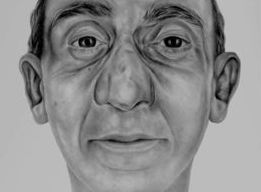TV programme to spotlight force`s year-long attempt to identify `mystery man on the moor`
A television documentary airing tonight (March 15) will try to throw new light on a man nicknamed Neil Dovestones who asked the way “to the top of the mountain” and was found dead on a bleak Peak District moor.
A television documentary airing tonight (March 15) will try to throw new light on a man nicknamed Neil Dovestones who asked the way “to the top of the mountain” and was found dead on a bleak Peak District moor.
Mystery remains over why the man, who has now been identified as David Lytton and originally from London, took rat poison hundreds of miles away in northern England two days after flying back to the UK.
Baffled Greater Manchester Police (GMP) detectives described the case as “unlike anything” they`d ever known leading to a massive investigation and an international hunt for clues sparking interest across the world as officers took 13 months to establish his identity.
They only did so after cross referencing flight details with surgical files from Pakistan that were more than a decade old.
Officers have ruled out any suspicious circumstances.
On Tuesday (March 14), Greater Manchester North`s senior coroner, Simon Nelson, recorded an open conclusion, saying that fundamental questions remain unanswered.
The coroner said he could not be sure of Mr Lytton`s intention. A pathologist said the most likely cause of death had been ingesting the rat poison strychnine.
He flew 4,000 miles from his adopted home in Pakistan, booked into a hotel for five days in the capital then paid for a return train ticket to Manchester. He went to a pub near Saddleworth Moor, asked the landlord directions to “the top of the mountain” and wandered off into the dark.
The smartly dressed man was wearing a light mac, trousers, a shirt and slip-on shoes and had no connection with Saddleworth.
Rochdale Coroner`s Court heard how the 67-year-old was discovered by a cyclist on the remote Chew track near Indian`s Head, the summit leading from Dovestone Reservoir on December 12, 2015.
He was carrying no identification only three train tickets, £130 in cash, and an empty medication bottle with a label in English and Urdu were found in his possession. Mr Lytton was “inadequately and inappropriately” dressed to go walking in winter on the moors.
He had been in a relationship for more than 30 years with a woman, the inquest heard, but did not even tell her he was moving to Pakistan in 2006 and simply left. He had also not spoken to his only brother for more than ten years before his death.
“He was a highly complex, private individual who tended to compartmentalise his life or not reveal or share his thoughts or future plans,” Mr Nelson told the inquest.
Mr Nelson said he was satisfied there was no third party involvement in Mr Lytton`s death and that he had taken the poison “by his own hand.
And it was not known where he had obtained the strychnine or “his prevailing intention” before ingesting the poison.
Mr Nelson, concluding the four-hour inquest, added: “This has been an extra-ordinary case for obvious reasons.
“Sadly, notwithstanding the quite outstanding investigative work by the police, there are many fundamental questions which remain unanswered.”
Police had launched an international hunt to identify Mr Lytton, focusing eventually on Pakistan, when a post-mortem examination revealed he had a titanium plate in his leg which was only manufactured and fitted in Pakistan.
A study of data by the National Crime Agency of flights between Pakistan to London revealed that a passenger with a striking resemblance to the artist`s impression of the mystery man had travelled from Lahore to London on December 10, 2015.
Detective Sergeant John Coleman of GMP described the case as “unlike anything I have ever known in 20 years as a police officer”.
DNA analysis confirmed Neil Dovestone a nickname given to him by mortuary workers at Royal Oldham Hospital was actually Mr Lytton, from London.
The inquest heard he had been born David Lautenberg, the family changed their name to Lauten, and he later changed his name again to Lytton, growing up in Finchley, north London.
Younger brother Jeremy Lauten described him as a “genius” who did well at grammar school and wanted to become an Oxbr


